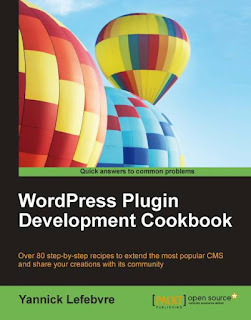WordPress Plugin Development Cookbook: Over 80 step-by-step recipes to extend the most popular
CMS and share your creations with its community
Download
Introduction
Developing plugins for WordPress is the next big thing for you if you are an administrator
looking to enhance a personal site with custom functionality for which no plugin exists, a
developer looking to enhance the WordPress platform with new ideas for the community,
or a website designer building a specific project for a client. Learning how to create
WordPress plugins will allow you to unleash the full potential of the most popular web
content management system.
As an early WordPress adopter, I started building plugins to add functionality to my personal
site. Once I got these new elements in place, I quickly realized that other users could benefit
from these extensions, and started distributing them online. To this day, I always love hearing
back from users of my creations and finding out how they have put them to use and what new
functionality they think would make them even better.
While developing plugins might initially sound a little bit like black magic, this book shows
you how easy creating plugins actually is through a series of step-by-step recipes. If you have
previously added code to a theme's functions file, you may even be familiar with some of the
mechanics explained in this book. With all of the information contained in this book, you will
quickly be able to create your own plugins or dissect existing ones to add that extra bit of
missing functionality that you require. Before you know, you'll be publishing your own
creations to the official WordPress plugin repository!
Let's start learning how to cook up great WordPress plugins!
What this book covers
Chapter 1, Preparing a Local Development Environment, shows plugin developers how
to install and configure an efficient development environment.
Chapter 2, Plugin Framework Basics, explains the basic mechanics of registering user
functions with WordPress to be executed at key points when web pages are displayed,
forming the basis of plugin creation.
Chapter 3, User Settings and Administration Pages, covers the creation of administration
pages that will allow the users to configure the plugins you create.
Chapter 4, The Power of Custom Post Types, empowers developers to add whole new content
management sections to the WordPress environment.
Chapter 5, Customizing Post and Page Editors, demonstrates how to alter the default
administration post and page editing environment to add new capabilities.
Chapter 6, Accepting User Content Submissions, allows users to submit their own content
to new content sections that will be managed by your plugins.
Chapter 7, Creating Custom MySQL Database Tables, leverages the power of MySQL to create
custom database tables in a site database to store and retrieve custom data.
Chapter 8, Leveraging JavaScript, jQuery, and AJAX Scripts, makes plugin output very dynamic
by using a number of popular script libraries.
Chapter 9, Adding New Widgets to the WordPress Library, indicates how to add new widgets
that users will be able to easily drag-and-drop to add content to their web pages.
Chapter 10, Enabling Plugin Internationalization, prepares your plugin to be translated to any
language to make it easier to be used by non-English speakers.
Chapter 11, Distributing Your Plugin on wordpress.org, shows you how to prepare your plugin
for sharing with the global WordPress community
Who this book is for
This book is for WordPress users, developers, or site integrators with basic knowledge of PHP
and an interest in creating new plugins to address their personal needs, client needs, or share
new ideas with the WordPress community.
Home Web Development WordPress Plugin Development Cookbook

